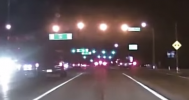- Joined
- May 14, 2013
- Messages
- 11,976
- Reaction score
- 8,442
- Location
- Oakland Park, Florida (USA)
- Country
- United States
- Dash Cam
- StreetGuardian.CAM Amazon.com

I don't know. I just watched that frame-by-frame. It's a tough call given the cam's angle. The cop likely had a better view. But, from what I can see, it certainly looks like his front tires crossed the stop bar before the red.
View attachment 17002
The moment that happens, you're "in the box" - and if happened before the light turns red, you haven't run the light. In fact, if you're caught "in the box" when the light turns red, you have right-of-way - and cross traffic, despite having a green light, has to wait for you to clear. If they hit you, they failed to yield. It all hinges on whether entry into the box was on yellow or red. One thing is for certain, if it's too close to call, there's no way that his split-second red-light running put anyone in harms way. Various DOT studies have conclusively determined that the single most effective way to increase intersection safety is to increase the length of the yellow cycle - followed by increasing the all-way-red timing.
It's exactly this mentality which causes the problem. You stop for the yellow light if you can safely do so- that is the law and you have failed to obey a traffic sign or signal when you don't.
For Michigan:That's a new one on me. Our statutes define yellow as warning that the light is about to change to red, but do not define penalties for failing to stop for a yellow. Can you cite the law you reference?
For Michigan:
MCL 257.612 states in part, " ...vehicular traffic facing the signal shall stop before entering the nearest crosswalk at the intersection or at a limit line when marked, but if the stop cannot be made in safety, a vehicle may be driven cautiously through the intersection."
The law is similar in most states. While I can't quote it exactly for SC, this was covered in a State-run Driver's Ed class I took to get points recovered from a traffic ticket a number of years ago. The instructor also noted that when approaching an intersection, you should expect the car in front of you to stop on yellow so that you don't hit them if they do. I've known a few people here who were hit from behind when they stopped for a yellow light- they were never charged but the car that hit them was.
Don't believe me just because I say it- look it up where you are or ask a local Cop.
Phil
"The dilemma zone occurs when the driver has no feasible choice," he said. "In other words, the driver can neither stop nor proceed through the intersection before the light turns red. This can also occur if the approaching vehicle is traveling faster than the posted speed limit and/or if the driver’s perception and reaction time is longer than the design one-second value."
The point he was trying to make about red light cameras is that red light companies try to make it sound like red light cameras will PREVENT the types of accidents like the one above with the white Buick, when nothing could be further from the truth. Red light cameras came down in Houston too, because of corruption (shortened yellows being the most obvious) but also because they got put up without being voted on first.Doesn't matter.
Once cop gives you a ticket, you are in the trouble regardless of fault or not.
Most of the times, paying is better than taking off from work to fight it and even if you fight, most of the time you lose.
+1The point he was trying to make about red light cameras is that red light companies try to make it sound like red light cameras will PREVENT the types of accidents like the one above with the white Buick, when nothing could be further from the truth. Red light cameras came down in Houston too, because of corruption (shortened yellows being the most obvious) but also because they got put up without being voted on first.
In the UK - probably elsewhere too - many traffic light controlled junctions now give a countdown for pedestrians letting them know how much time they have left to cross.That's why extending yellow cycles makes intersections safer - it reduces that 'zone of dilemma' - allowing vehicles more time to clear the intersection. For certain vehicles and driving conditions, the minimum yellow time as defined for a given intersection is woefully inadequate. And some cities have been caught shortening them even lower than state minimums on, you guessed it, intersections with red-light cameras.
That sort of exists now on intersections with separate pedestrian signals. Their signals start flashing or counting down long before the yellow light comes on for vehicles and I use that as an 'early warning system'.In the UK - probably elsewhere too - many traffic light controlled junctions now give a countdown for pedestrians letting them know how much time they have left to cross.
It seems to me this would be of equal use to motorists, and improve safety.
But of course the anti-motoring zealots will bleat that it will encourage drivers to cut it fine. I don't think that's true. Those who chance it will take chances either way. But giving more information allows responsible drivers to make informed decisions.
